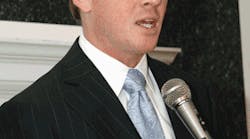WHEN Thomas Dirmyer spoke at last year's Intermodal Bulk Liquid Symposium, he addressed the economic uncertainty and predicted a difficult environment for 2011.
He's not sure whether he was lucky or insightful, but this year turned out to be just as he warned it would be. Dirmyer provided an update on his prediction during the 2011 Intermodal Bulk Liquid Symposium that was organized by the Intermodal Tank Container Association and was held October 20 in Kemah, Texas.
How bad has it been? Dirmyer, chief operating officer of CLP Chemical Company, joked that he has called his sales people so often to complain that he decided to start buying disposable cell phones, so that when he does call, they don't recognize his number and they actually answer.
He said that with all the political, social, and economic ills facing this industry now, it's time to evaluate how customers are being served and what is being done to earn their continued business.
“We have tight trucking capacity and a lot of problems,” he said. “The next five years will separate the men from the boys. This is an industry where everybody does basically the same thing. From my perspective as a buyer of transportation services, I work with some people in this room where I can't remember the last time something went wrong at all. Yet there are other carriers where we do the same thing and probably share the same driver and it rarely goes well. So it's all about your corporate culture, how you look at customer service, how you communicate issues, and how you can get out of that rut. We've become a business that accepts mediocrity. Now is the time to end all that.”
In “The Changing Face of Customer Service,” Dirmyer identified three entities that he feels have customer-service issues — airlines, cell phone providers, and the Department of Motor Vehicles — and laid out a plan for how to avoid becoming like them.
He did it with the help of these arcane and seemingly unrelated people, places, and things: fortune cookies, hotel wake-up calls, the Bermuda Triangle, a Japanese car, and the Dalai Lama.
- Fortune cookies.
“No one likes surprises when it comes to their shipment. Proactive communication is the key. We work in an environment where failures are communicated via surprise. People are shocked these failures happened. Every Monday morning, I have a customer-service meeting with our staff. This year, that has been one of the most painful hours of the week. I walk into a hornets' nest: ‘This didn't deliver on time.’ ‘This driver went to the wrong plant.’ Customer service is inconsistent, just like fortune cookies. You never know what you're going to get until you crack it open. You don't want to see that. You want to see ahead of time.”
- Hotel wake-up calls.
“In recent months, we've had a rash of customer-service failures in my business. We discuss things and what went wrong: ‘The paperwork was wrong.’ ‘The driver overslept.’ ‘We got a flat tire.’ Certain mechanical items are not completely preventable, but one thing that bugs me most is, ‘The driver overslept.’ It drives me crazy. Having lived out of a suitcase for about 10 years, I know what it's like to stay at a hotel. I never missed a meeting, because (the hotel has) a wake-up call. I've done the investigation and have the information: You can wake up 400 different people at different times using a wake-up call system that costs $2,200. For any carrier interested in investing in it, I think it would be wise. We have repeated failures we all have heard over and over. My challenge to you as leaders is to wake people up literally and figuratively to avoid customer-service failures.”
- The Bermuda Triangle.
“Any time there's a customer-service failure, we like to throw around terms like ‘root-cause failure analysis.’ We like to drill down, open up the hood, and peel back the onion. What are we really doing to get to the bottom of this? When anything goes wrong, it's a person, process, or piece of technology. It can be any combination. I call that the Bermuda Triangle. Are people using all the tools that are available to them to communicate with customers about being on time, about being safe, about choosing the right tank, about putting all the right gaskets on a tank to avoid a deadly situation? The industry is changing so fast. It's time to talk to your customers and ask, ‘What do you want? How do you want to hear about problems?’ Your own communication channels are very important to address right now. There's no better time than right now to rally the troops and say, ‘Think it's hard now? There are going to be new regulatory issues and environment issues. Be ready for them.’ Is your organization agile enough to adapt to these changes and still make money and take care of customers and be safe?”
- A Japanese car.
“In the 1980s, the auto industry had stalled. You had the Big Three in Detroit and a lot of lower-quality imports, specifically from Japan. The Germans had the luxury-car market locked up in the United States. Lexus' first sedan shocked the world. They spent 10 years working on it and over a billion dollars to produce the first prototype in a world where nobody wanted it. They said, ‘Things are changing and some day people will be able to pay a premium for higher quality and better service.’ They developed it and asked customers what they wanted and really transformed not only their own company but the entire industry. The first LS 400 was released in 1990. Within just a few years, they had transformed themselves from an unlikely outsider to one of the industry leaders as they redefined the idea of a luxury dealer and built a dealer network that provided unprecedented attention to service. In 1988, two years before the first car came off the assembly line, nobody would have predicted anyone would pay $34,000 for a Japanese luxury car. Today, they sell 16,000 cars a month and are number one in customer service.
“Why does this matter? What does this have to do with drivers, trucks, fuel, tank containers, and showing up on time? The guy who runs the brand for Toyota is an American gentleman, and he says they don't sell cars — they sell service and experience. You don't sell drivers, trucks, and fuel. You sell an experience. I never get to meet drivers. I never see the truck. I never put fuel in them. All I see is the paperwork. Most individuals like me who purchase transportation don't get to be hands-on and don't want to. I want customer-service issues communicated clearly and bills showing up on time, clear and precise pricing, sales people who communicate capacity issues and market-trend headwinds very clearly. There are a lot of people who think in this industry that no one will pay a premium for good service. I think that's incorrect, and I think that's changing. With all the shifts going on politically and environmentally and with drivers, there will be a premium paid for customer service.”
- The Dalai Lama.
“I sit down a lot with the Lama, and we talk about business and my own unorthodox view of customer service and ways to fix what's broken. Our business is at a crossroads. I think the herd is going to become thinner. I think merger and acquisition activity among carriers is going to continue and get more aggressive. Insurance is a big deal. That's going to make it more difficult to operate. The chemical industry will not be measured in good years or bad years. There are going to be good quarters and slow quarters. Peaks will get taller and valleys will get deeper, and they will be much closer together. Now is the time to get your people to figure out what your brand means and how customer service impacts profits. Good customer service can't be taught and learned. It's an obligation that's felt by everybody in your organization from drivers and mechanics to the CEO. As an industry, I don't think it's right that we accept inferiority. Let's raise the bar. It's time to think and act differently.”
He said this Dalai Lama quote from Practice 31 of the “Thirty-Seven Practices of Bodhisattvas” rings powerfully:
“If you don't examine your own errors, you may look like a practitioner but not act as one. Therefore, always examine your own errors and rid yourself of them.” ♦









